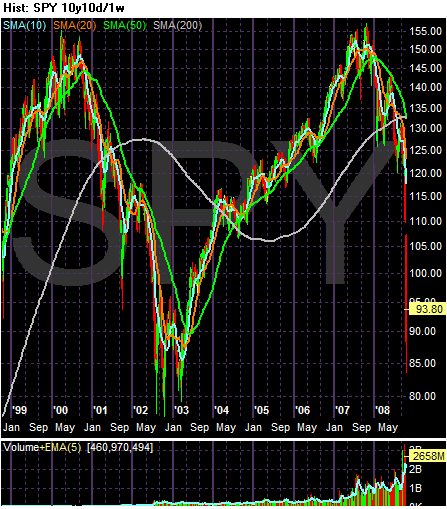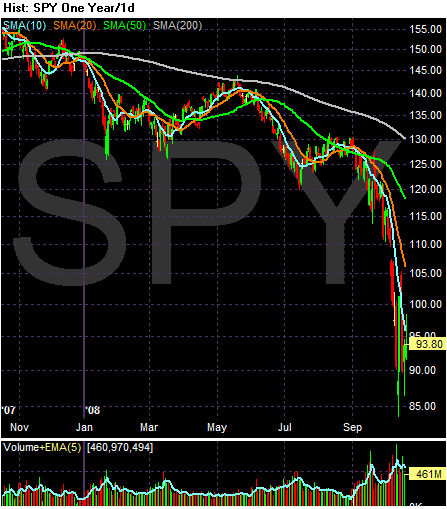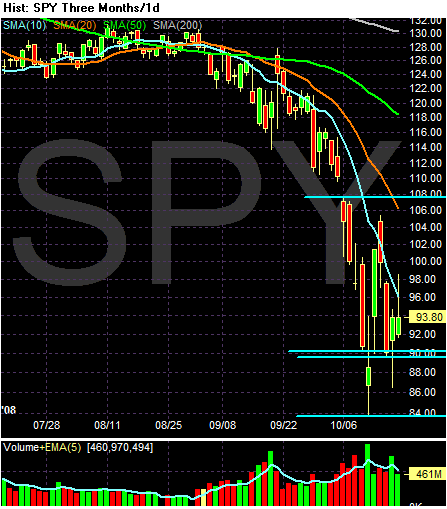It's that time of the week -- do anything except think about the market. I'll be back on Monday. Or you can catch me tomorrow morning at 9AM CST on KTLK.
Until then....






Spreading layoffs could further exacerbate weakness in consumer spending, the largest driver of U.S. economic growth, and delay any recovery. "A weak labor market makes consumers and businesses even less creditworthy and causes lenders to pull back even further," says Barclay's Mr. Pandl.
Many manufacturers, meanwhile, says they have seen a sudden drop in orders and are quickly moving to cut jobs to avoid building up inventories. Makers of construction machinery, powerboats, appliances and copper pipe are among those shedding workers.
Meanwhile, at the center of the economic crisis, financial companies continue to lay off thousands of workers. Cleveland-based National City Corp. said this week it would eliminate 4,000 jobs, or 14% of its work force. Goldman Sachs Group Inc. is preparing to lay off 10% of its 32,500 employees, according to people familiar with the matter. And Bank of America Corp. is expected to lay off thousands of workers as it completes its acquisition of Merrill Lynch & Co. The financial-services industry has lost 172,000 jobs since December 2006, according to the Labor Department.
In another ominous sign, UPMC, the big Pittsburgh-based hospital system, said this week it was laying off 500 employees as part of continuing cost-savings initiatives. The layoffs are almost entirely "nonclinical" and are coming from all parts of the hospital network, which employs about 50,000.
Drug makers, which have been paring costs for years, are now broadening the scope to include executives and researchers.
Merck, which has eliminated 10,400 jobs over the past three years, said Wednesday it will cut 7,200 positions, or 12% of its work force, by the end of 2011. The layoffs will touch every part of the company, from sales representatives to researchers, and a quarter will be mid- and senior-level executives. The company is closing labs in Seattle, Japan and Italy.
Chief Executive Richard Clark said the latest cost-cutting wasn't a reaction to the company's 28% decline in third-quarter profit but part of longstanding efforts to reposition Merck for a new era.
In a sign of weakness in the consumer economy, Coca-Cola Enterprises, the world's largest soft-drink bottler, said on Thursday it has laid off more than 1,000 people, primarily from management ranks, in its North American operations since Labor Day. The bottler has been struggling to revive soft-drink sales in the U.S.


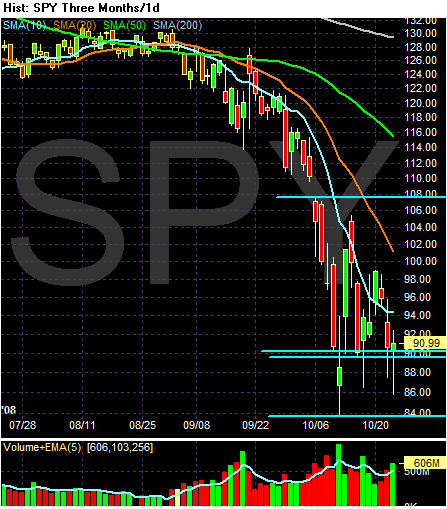
In September, there were more mass layoffs -- instances in which employers slashed 50 or more jobs at one time -- than in any month since September 2001, the Labor Department said yesterday. And nearly half a million Americans have filed new claims for unemployment benefits in each of the past four weeks, the highest rate of such claims since just after the terrorist attacks seven years ago.
Anecdotal reports suggest that the hemorrhaging in the job market has only begun. Companies that announced plans this week to cut jobs include Internet company Yahoo (1,500 positions), pharmaceutical company Merck (7,200), National City bank (4,000) and Comcast, the cable company (300).
.....
Villella and others who work with employers said that for many companies, the pullback in hiring is not a direct result of tightening credit. Rather, firms simply don't know whether their own customers will be affected by the financial crisis; as a result, they want to hold their breath and delay hiring decisions until they have a better sense of the future.
The nation has shed jobs every month this year, but at a slower overall pace than in past economic downturns. The slide accelerated in late summer, with declines similar to those in past recessions. Last month, employers shed 159,000 jobs, the most this year and more than the average number of monthly job losses in the terrible labor markets of 2001 and 2002.
More obscure indicators monitored by economists at the Federal Reserve and in the private sector also show an inflection point in late summer. For example, employers had 214,000 fewer job openings in August than in July, according to a Labor Department report. Over the past year, the number of openings dropped by a more modest average of 74,000 per month.
Indeed, many companies are imposing hiring freezes. Such moves don't often get the kind of headlines that layoffs do, but because they shrink the number of places people can turn to for jobs, they still hurt the economy.
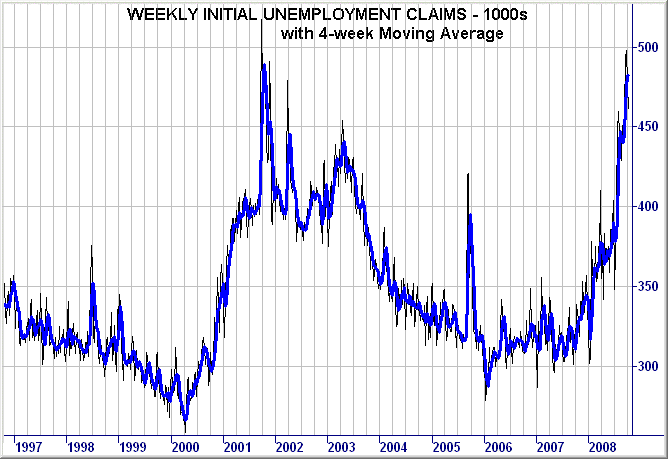
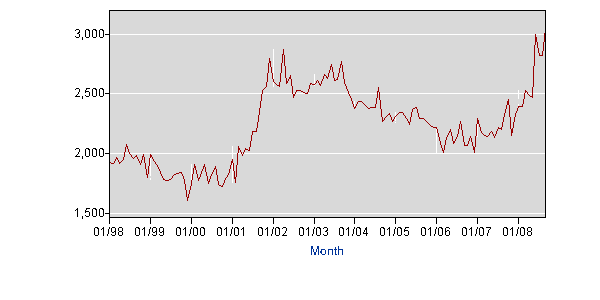
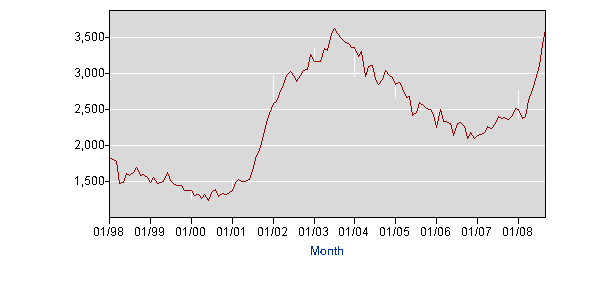
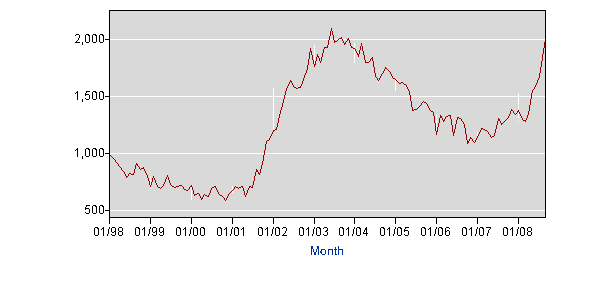
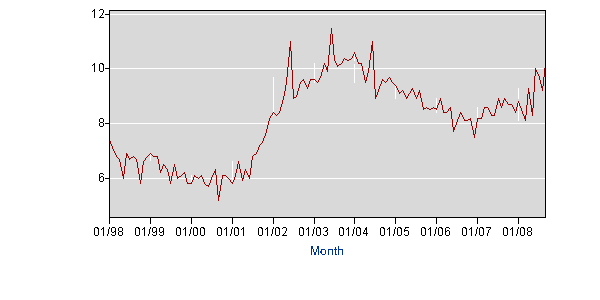
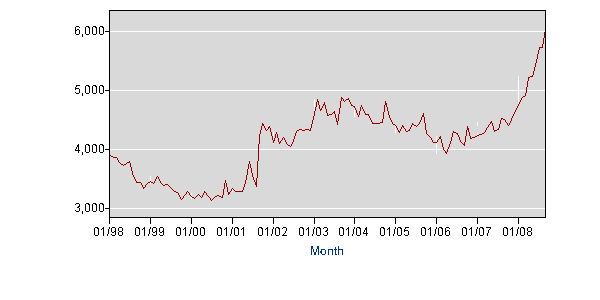
In May 2005 speech, Greenspan said that ``private regulation generally has proved far better at constraining excessive risk-taking than has government regulation.''
.....
Greenspan opposed increasing financial supervision as Fed chairman from August 1987 to January 2006. Policy makers are now struggling to contain a financial crisis marked by record foreclosures, falling asset prices and almost $660 billion in writedowns and losses tied to U.S. subprime mortgages.
Today, the former chairman asked: ``What went wrong with global economic policies that had worked so effectively for nearly four decades?''
Greenspan reiterated his ``shocked disbelief'' that financial companies failed to execute sufficient ``surveillance'' on their trading counterparties to prevent surging losses. The ``breakdown'' was clearest in the market where securities firms packaged home mortgages into debt sold on to other investors, he said.
Developing nations' borrowing costs jumped to the highest in six years as Belarus joined governments seeking a bailout from the International Monetary Fund to help weather the credit crisis and slump in commodities.
The extra yield investors demand to own emerging-market government bonds instead of U.S. Treasuries rose 25 basis points to 8.27 percentage points, the most since November 2002, according to JPMorgan Chase & Co.'s EMBI+ index. The annual cost to protect Russia's bonds from default soared 1.3 percentage points to 10.8 percent of the debt insured, the highest in at least eight years, according to CMA Datavision.
``There is now no safe haven globally other than a deeply indebted U.S. government,'' said Jim Reid, head of fundamental credit strategy at Deutsche Bank AG in London. ``The events of the last few days are categorical evidence of the globalization of the credit crunch and its subsequent problems.''
Ex-Soviet Belarus followed Iceland, Pakistan, Hungary and Ukraine in requesting emergency loans as the global financial crisis limits its ability to borrow, the IMF said yesterday. Argentina's lawmakers are attempting to stop President Cristina Fernandez de Kirchner seizing pension funds from money managers, as the country risks defaulting for the second time this decade.
Emerging-market stocks, bonds and currencies are getting battered as the financial crisis that began with U.S. mortgages last year pushes the global economy toward a recession, crimping the demand for the commodities that sustain most developing nations' finances. The IMF forecast global growth will slow to 3 percent in 2009, from 3.9 percent this year, signaling a global recession.
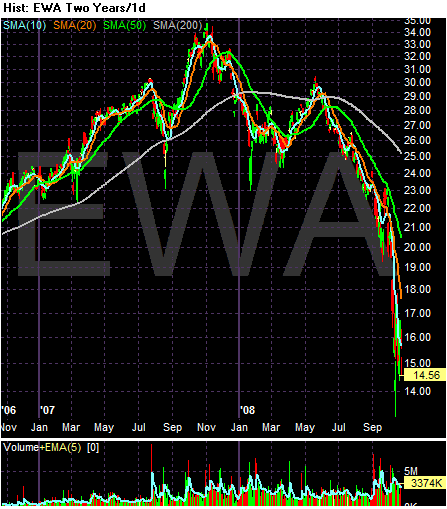
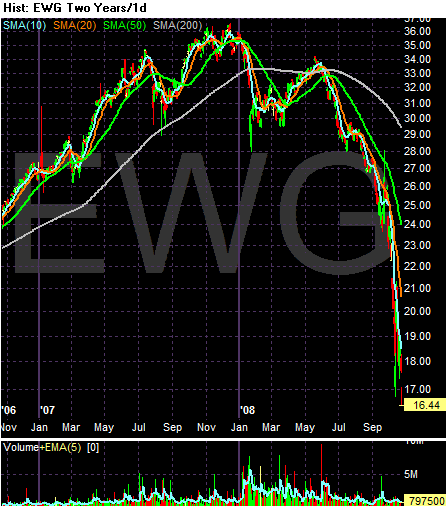
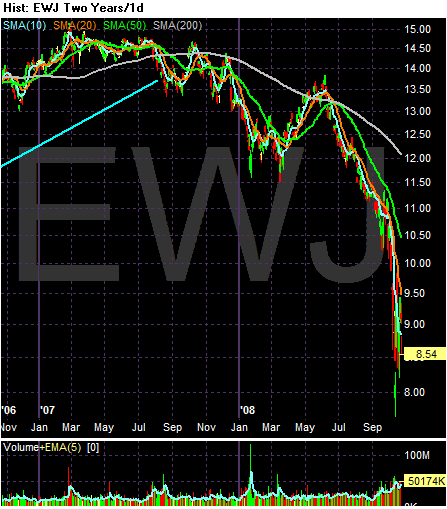
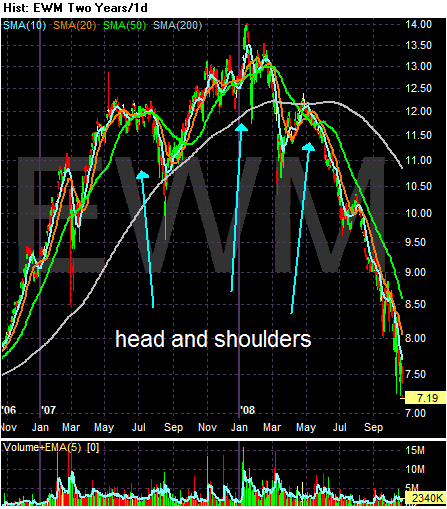
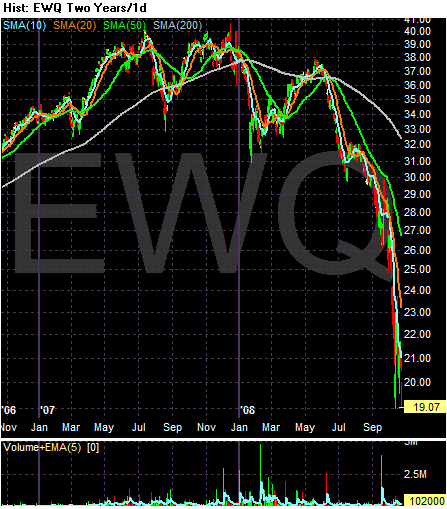
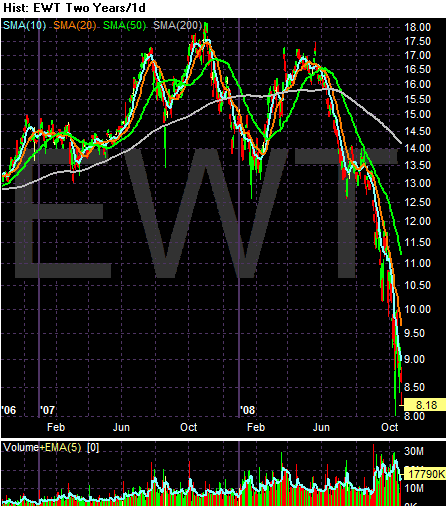
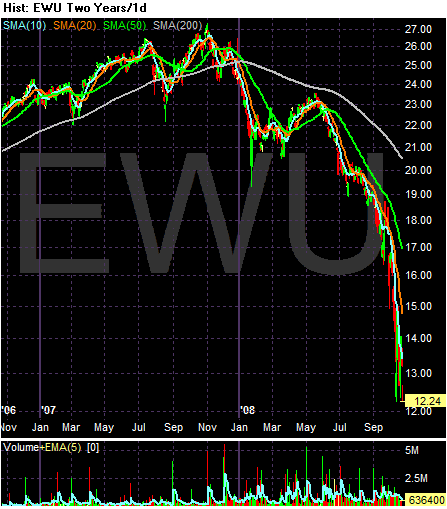
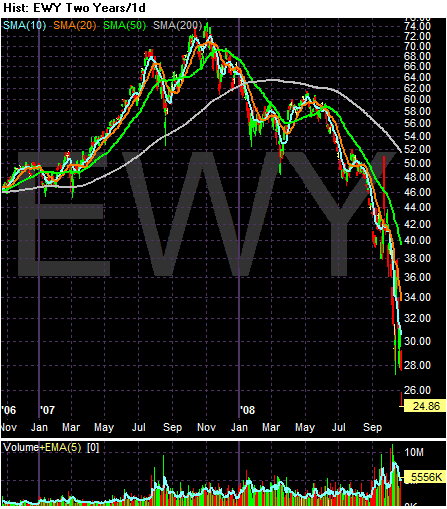
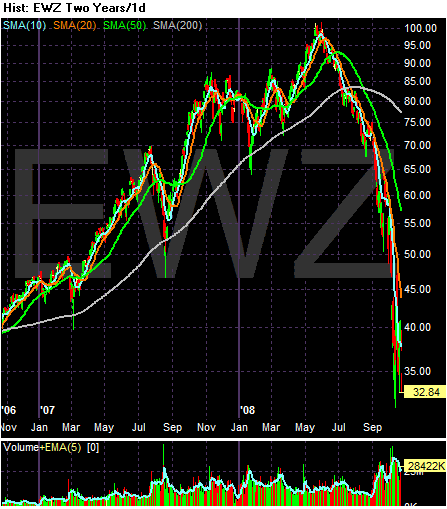


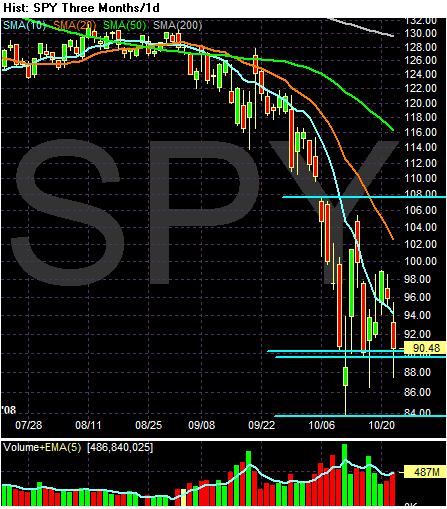
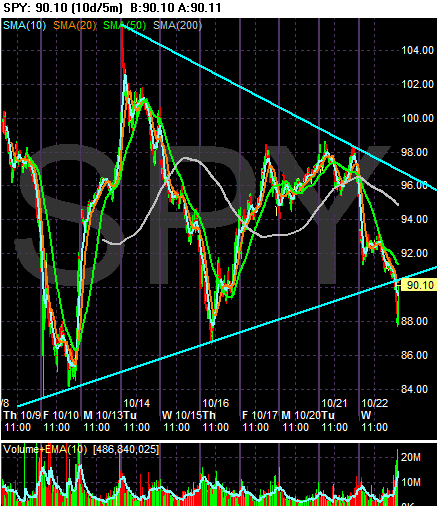
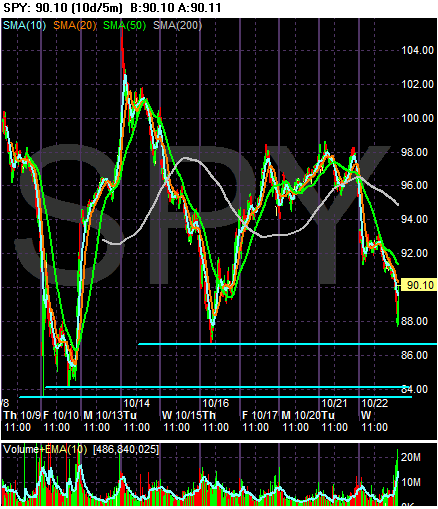
Former executives from Standard & Poor's and Moody's Investors Service told lawmakers today that credit raters relied on outdated models in a ``race to the bottom'' to maximize profits.
Jerome Fons, a former managing director of credit policy at New York-based Moody's, told the House Oversight and Government Reform Committee today that originators of structured securities ``typically chose the agency with the lowest standards, engendering a race to the bottom in terms of rating quality.''
Representative Henry Waxman, the committee chairman, said that the recent history of the credit rating companies ``is a story of colossal failure.'' ``The result is that our entire financial system is now at risk,'' Waxman said.
The House panel is reviewing the role played by S&P, Moody's, and Fitch Ratings in the global credit freeze. The Securities and Exchange Commission in a July report found the firms improperly managed conflicts of interest and violated internal procedures in granting top rankings to mortgage bonds.
The top executives of the credit-rating companies said in written testimony that they were unprepared for the sharp drop in home prices and that their systems failed.
``Events have demonstrated that the historical data we used and the assumptions we made significantly underestimated the severity of what has actually occurred,'' said Devan Sharma, president of New York-based S&P.
Employees at Moody's Investors Service told executives that issuing dubious creditworthy ratings to mortgage-backed securities made it appear they were incompetent or ``sold our soul to the devil for revenue,'' according to e-mails obtained by U.S. House investigators.
The e-mail was one of several documents made public today at a hearing of the House Oversight and Government Reform Committee in Washington, which is reviewing the role played by Moody's, Standard & Poor's and Fitch Ratings in the global credit freeze.
About 12 million U.S. homeowners owe more than their homes are worth, compared with 6.6 million at the end of last year and slightly more than 3 million at the close of 2006, said Mark Zandi, chief economist at Moody's Economy.com.





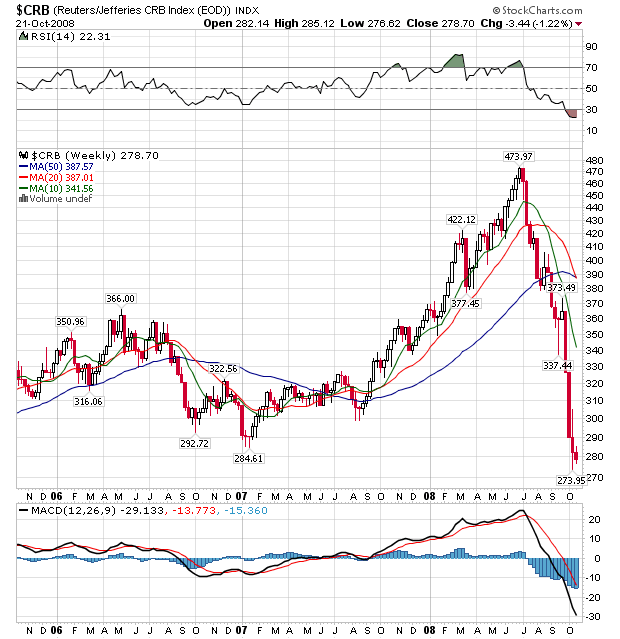
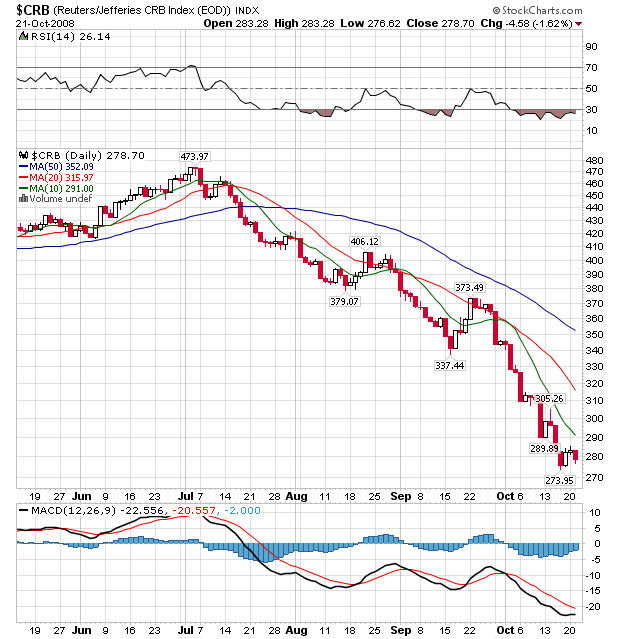
The technology sector led the declines, down 3.8 per cent overall. Texas Instruments fell 7.7 per cent to $16.60 after the technology company disclosed worse-than-expected results after the bell on Monday.
Sun Microsystems and Logitech sustained some of the heaviest losses, down 14 per cent to $4.97 and 14.5 per cent to $15.63, respectively, after their updates both indicated a downbeat outlook.
.....
AK Steel retreated 3.3 per cent to $14.61 after the group said prices would be down about 10 per cent towards the end of the year while DuPont lost 2.8 per cent to $35.20 after the chemicals company cut its full-year forecast.
Lockheed Martin fell 3.2 per cent to $90.20 after the defence group reduced its guidance for next year on concerns of reduced military spending by the next administration.
.....
Fifth Third, which said it may ask to be included in the Treasury’s plan to buy stakes in U.S. banks, fell 11 per cent to $10.88 on the back of poorly received results.
Regions Financial lost 2.7 per cent to $11.90 after its earnings from continuing operations fell 76 percent in the third quarter, which was below analyst forecasts.
National City, hurt by increased mortgage reserves and losses from construction loans, fell 5.5 per cent to $3.08 after posting its fifth straight quarterly loss.
Keycorp, also dented by an increase in reserves for bad loans, added 8.8 per cent to $10.63 after posting its second straight quarterly loss.
Unfortunately, at risk of invoking the four most expensive words in the English language, "this time it's different."
Why?
Because the US consumer is finally broke. For thirty years, we piled on debt and then spent almost every new penny we got. This borrowing spree was made possible by a smorgasbord of no-money-down lending products and ever-appreciating asset prices. Unfortunately, the situation has now changed. The lenders who created those products have now been demolished, and asset prices are falling fast. And this is leaving American consumers with no choice but to cut back.
A few exhibits:
US debt has risen from 163% of GDP in 1980 to 346% in 2007. Household debt, a subset of this, has risen from 50% of GDP to 100%. (Please click here if you would like to see charts that illustrate the points I'm making here)
The US has been on a consumption binge of epic proportions all on the misguided belief that real estate prices would keep on rising forever, at a clip of 8% or more a year. No one ever bothered to do the math as to how anyone could possibly afford to pay the projected prices. Real wages were shrinking but somehow everyone could get rich selling houses to each other.
The "Housing Prices Always Go Up" dream has finally crashed on the rocks of reality. However, while the party was still going on, consumers were willing to go deeper and deeper in debt, buying new kitchens, taking expensive vacations, buying boats, buying SUVs "needed" to haul all the junk around they were buying, etc. And as long as home prices kept rising, everyone ignored the debt side of the balance sheet.
Now, the party has ended, and asset prices are crashing but the debt still remains. Consumers are now very concerned (finally), about the debt side of the balance sheet. It is going to take an amazing shift from consumption to savings to pay down that debt. And a secular shift from consumption to saving is now underway. "Cool To Be Frugal" is actually an understatement.
....People who overconsumed during the past decade are now rejecting extravagant lifestyles. They're spending less, and more wisely. Some are getting their finances in order. Others are fearful of losing their jobs, shocked by investment losses, or hunkering down amid the general uncertainty.
The penny-pinching is already showing up in the numbers; this quarter could mark the first fall in personal consumption in 17 years. And with credit tight and Americans loaded down with $2.6 trillion in personal debt, consumer borrowing dropped in August, the first such contraction since 1991. Menzie D. Chinn, who teaches economics at the University of Wisconsin, figures consumers won't be in a position to spend freely for five years.
Which brings us to what John Maynard Keynes called the paradox of thrift. What's good for the individual, argued the famous economist, can ignite or deepen a recession. But that won't deter the newly thrifty. "I can't help the economy," says Kim Schultz, a resident of hard-hit Avoca, Mich., who with her husband, Jon, owes $40,000 in credit-card debt. "I've got to help myself." On the other hand, this newfound austerity could—emphasis on could—rewire Americans as savers rather than spenders. And that would help put the economy on a sounder footing over the long haul.
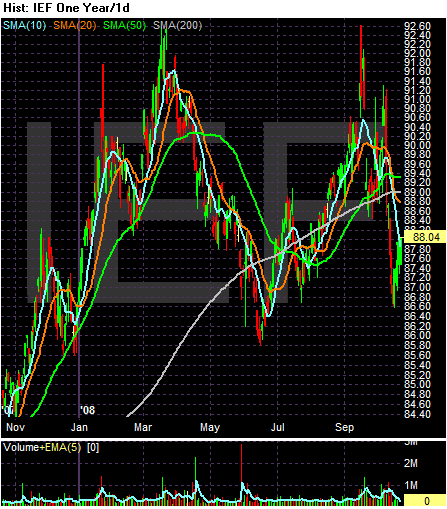
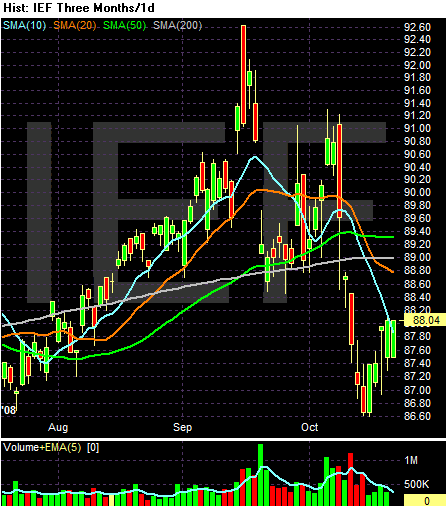
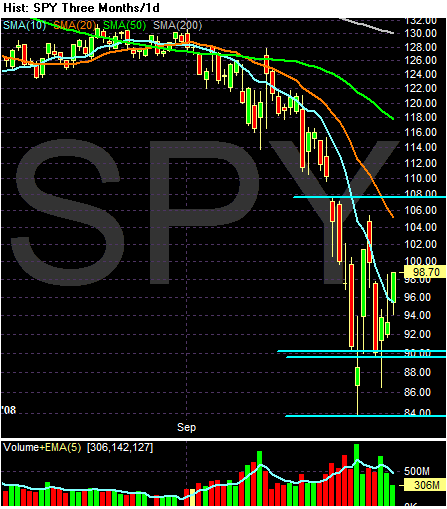
Federal Reserve Chairman Ben S. Bernanke endorsed additional fiscal stimulus, saying the credit crunch is ``hitting home'' as Americans find it harder to get loans, threatening a prolonged economic slump.
Lawmakers ``should consider including measures to help improve access to credit by consumers, homebuyers, businesses and other borrowers,'' Bernanke said in testimony to the House Budget Committee. ``Such actions might be particularly effective at promoting economic growth and job creation,'' he said, calling consideration of a stimulus ``appropriate.''
.....
House Speaker Nancy Pelosi has proposed an initiative of as much as $150 billion after the credit crunch deepened in recent months and the effect of the first stimulus package wore off.
Budget Deficit
Wisconsin Representative Paul Ryan, the budget panel's ranking Republican, said in the hearing that the Democratic plan is ``bloated'' and may balloon the budget deficit to $1 trillion. ``Throwing more money out the door may help for a quarter, but it won't help to create jobs,'' Ryan said afterward.
Bernanke, under questioning, declined to recommend a size for the package. He said the current ``large'' deficit is ``not totally inappropriate given the nature of the emergency that we're facing and not totally avoidable given the loss of tax revenues.''
THE financial world is a mess, both in the United States and abroad. Its problems, moreover, have been leaking into the general economy, and the leaks are now turning into a gusher. In the near term, unemployment will rise, business activity will falter and headlines will continue to be scary.
So ... I’ve been buying American stocks. This is my personal account I’m talking about, in which I previously owned nothing but United States government bonds. (This description leaves aside my Berkshire Hathaway holdings, which are all committed to philanthropy.) If prices keep looking attractive, my non-Berkshire net worth will soon be 100 percent in United States equities.
Why?
A simple rule dictates my buying: Be fearful when others are greedy, and be greedy when others are fearful. And most certainly, fear is now widespread, gripping even seasoned investors. To be sure, investors are right to be wary of highly leveraged entities or businesses in weak competitive positions. But fears regarding the long-term prosperity of the nation’s many sound companies make no sense. These businesses will indeed suffer earnings hiccups, as they always have. But most major companies will be setting new profit records 5, 10 and 20 years from now.
Let me be clear on one point: I can’t predict the short-term movements of the stock market. I haven’t the faintest idea as to whether stocks will be higher or lower a month — or a year — from now. What is likely, however, is that the market will move higher, perhaps substantially so, well before either sentiment or the economy turns up. So if you wait for the robins, spring will be over.
